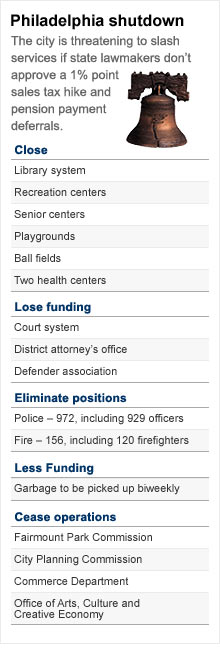Showdown over Philadelphia budget crisis
Philadelphia will shut libraries, playgrounds and courts by Oct. 2 if the state doesn't grant a tax hike and pension relief. Other cities also could face dire straits.
NEW YORK (CNNMoney.com) -- Hard times are hitting the people of Philadelphia, one way or another.
The best-case scenario: Philadelphians will pay 14.3% more in sales taxes for the next five years. This is on top of earlier cuts that already reduced library hours, tree trimming, snow plowing and collection of tires and bulk items.
At worst, they'll lose their libraries, courts, playgrounds and senior centers. Residents will have nearly 1,050 fewer police officers and firefighters to protect them, and they'll have to hold onto their garbage for two weeks.
What ultimately happens hinges on whether the Pennsylvania Legislature approves the city's request to hike its sales tax by 1 percentage point and defer pension payments for two years. Mayor Michael Nutter has said he'll send out 3,000 layoff notices and order the shutdowns to begin Oct. 2 if lawmakers don't give him an answer by Friday.
"We deeply regret to inform you that due to the lack of State budget authority, the City of Philadelphia may no longer have the funds to provide a full range of critical services, severely impacting our residents, businesses and visitors," according to a message posted on the city's Web site. Nutter declined a request for comment.
The drama playing out in Philadelphia could be repeated in cities across America as the recession takes its toll on municipal tax revenues. While the national economic picture may be brightening a bit, cities and states face many tough choices in the years ahead.
More than nine out of 10 cities are slashing spending this year as the recession wreaks havoc on their sales and income tax revenue, a recent National League of Cities study found. And the future looks even worse.
"Cities are offering services and paying salaries they can't afford at the moment," said Larry Eichel, project director for Pew Charitable Trusts' Philadelphia Research Initiative, a think tank focused on city issues. "Cities like New York, Chicago and Boston are all looking at big deficits for next year."
To be sure, there are places suffering more than the City of Brotherly Love. But Philadelphia's leaders have had to make some difficult decisions over the past year.
The trouble first surfaced in November, when Nutter announced the city was facing a $108 million deficit for the fiscal year, which ended June 30. Officials had to slice into the $4 billion budget, requiring non-union city workers to take furlough days, suspending scheduled business and wage tax cuts, removing equipment from some fire stations, reducing police overtime and cutting 800 mostly-vacant positions.
The city closed another $1.4 billion hole in its five-year spending plan this spring in part by raising fees and eliminating another 250 positions. But the key to balancing the budget was raising the sales tax rate to 8% and deferring pension payments.
These last two moves, however, require approval from Harrisburg lawmakers. While they are expected to grant Philadelphia's request, an official vote has been delayed as the legislature battles over the still-unpassed fiscal 2010 budget.
A vote this week is possible, but may be delayed further.
Nutter, however, says the city can't wait any longer. Notices of the imminent closings started going up in buildings and on agency Web sites last week. Residents are receiving automated calls that their garbage will only be picked up every other week.
While the most draconian moves may never actually happen, the delay in Harrisburg has already cost the city nearly $20 million in anticipated sales tax revenue.
As a result, Philadelphia has had to push back the start of its police cadet class, reduce maintenance on city property, cut the hours of its 311 info line and devote fewer resources to the licenses and inspections department, which is already overwhelmed, officials said. And in mid-July, the city started delaying payments to vendors, resuming only after it received a $275 million short-term bank loan earlier this month.
"We are providing services, though not at the level we would like," said City Councilwoman Marian Tasco, the majority leader who chairs the finance committee. "When you have less personnel, you have less ability to provide the services you need."
Tasco's staffers, for instance, recently called the city's duplicating office to copy a community resource booklet only to be told it didn't have enough paper. They ended up copying a smaller number in-house since they are also have a limited paper supply.
Even if Harrisburg approves the city's request soon, Philadelphia and its residents will have to deal with a tight budget for the time being, officials said.
"Everybody understands there has to be some sacrifices in this economy," said Controller Alan Butkovitz. "It's a cycle we see periodically." ![]()



